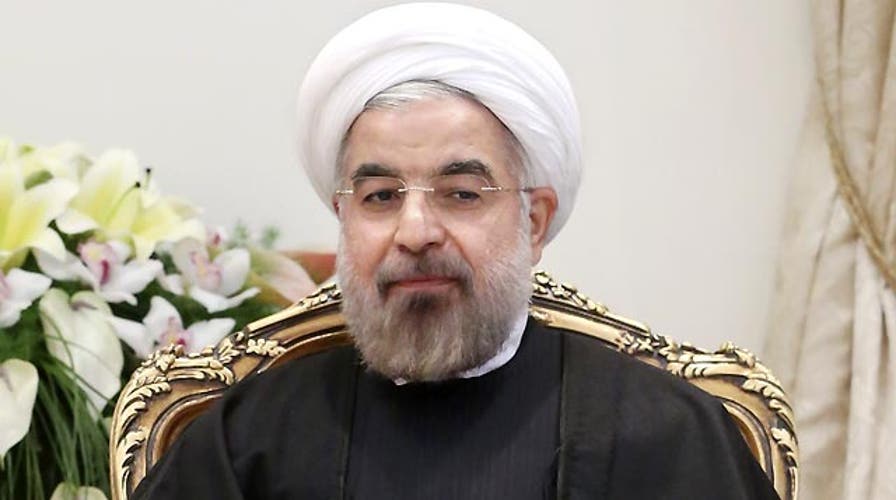This is a rush transcript from "Special Report," November 11, 2013. This copy may not be in its final form and may be updated.
BRET BAIER, ANCHOR: Well, in Geneva, it was said to be a deal in the making with Iran, the P5 plus One plus Iran on a nuclear arms deal. It kind of fell apart. It's still in negotiations. But it is said that France wanted tougher terms for Iran.
We're back with the panel. Steve, there's different reporting about this. Secretary Kerry says Iran stepped away from the table. The bottom line is the big deal is not done yet.
STEVE HAYES, SENIOR WRITER, THE WEEKLY STANDARD: That's good news for pretty much everybody. The stories about how this actually came to be or came not to be are fascinating. Where you have one report in The Guardian today with the French foreign minister hurrying to sort of intervene before the United States and Iran could agree on a bad deal and then making his case and ultimately persuading Secretary Kerry.
But look, the French deserve credit for leading on this. It's not what I would have predicted at the beginning of these talks. It's very clear that Israel is deeply concerned. I don't think that this is new. When you look at the statement that Prime Minister Netanyahu made last Friday, it was a scathing denunciation of this would-be deal, delivered, it should be noted, in English, I think for a reason, the kind of talk we really haven't heard from him. But, if you go back to his meeting at the White House, and then the speech that he gave at the United Nations a short time later, it's very clear that he thinks that Israel is on its own.
BAIER: And Congress seems like it's anxious in a bipartisan way to get involved in these discussions, possibly passing more sanctions from Capitol Hill.
A.B. STODDARD, ASSOCIATE EDITOR, THE HILL: Right. Not to actually reach a deal, to increase our leverage and tighten sanctions.
It really is interesting. What Steve said is really to me is the only thing that matters. There is no deal with the Israelis strongly, vigorously opposing this and rejecting it. The path to a deal is through something that Israel can live with. Obviously Senator Graham is right. President Obama's domestic agenda is in the toilet right now with ObamaCare and he is desperate for a deal. I think he will keep on trying for one. And maybe, you know, maybe he can get somewhere if he changes the terms. But you can't get to a deal and leave Israel saying this is a terrible deal.
And I think forcing the issue of peace talks with the Palestinians at the same time is really a mistake. I think they should stick to a deal on Iran and nukes and then get some verification in exchange for sanctions relief and put off the Palestinian peace talks for another time.
BAIER: Let me share this from our Bing.com site. You say, will a deal ultimately be reached with Iran? 90 percent say no, 10 percent say yes. Charles?
CHARLES KRAUTHAMMER, SYNDICATED COLUMNIST: Well, the 90 percent ought to be that it shouldn't be reached on these terms. The Israelis were not the ones who stopped this – the Israelis weren't even in Geneva. It was the French who stopped it. The French foreign minister called it a sucker's deal and the French have been at negotiations for several centuries and they know one when they see one.
And the reason why this is a sucker's deal is this. It's quite simple. The only reason that the Iranians are at the table is because the economic sanctions are so strict and so harsh right now that the regime's stability is threatened. The only way Iran would ever give up nukes, ever, is if the regime has a sense that it is threatened. That's the only thing that would stop them. And they are now beginning to worry about economic instability in the country.
So here we are at a point of maximum leverage. And what does this so-called deal offer? It relieves the Iranians. It changes -- it weakens the infrastructure of the sanctions, allows the Iranians to deal in oil and gold and gives them a doubling of their cash on hand, which would relieve the pressure. And it does nothing about the infrastructure of their nuclear program. In other words, it takes away our leverage and it gives them a free ride. That's why the French walked away, and that's why if we conclude anything like this it will be a disaster.
BAIER: That is it for the panel. But stay tuned for touching moments involving our heroes. Plus, SR Bing Pulse highlights. Keep it here.
Content and Programming Copyright 2013 Fox News Network, LLC. ALL RIGHTS RESERVED. Copyright 2013 CQ-Roll Call, Inc. All materials herein are protected by United States copyright law and may not be reproduced, distributed, transmitted, displayed, published or broadcast without the prior written permission of CQ-Roll Call. You may not alter or remove any trademark, copyright or other notice from copies of the content.

